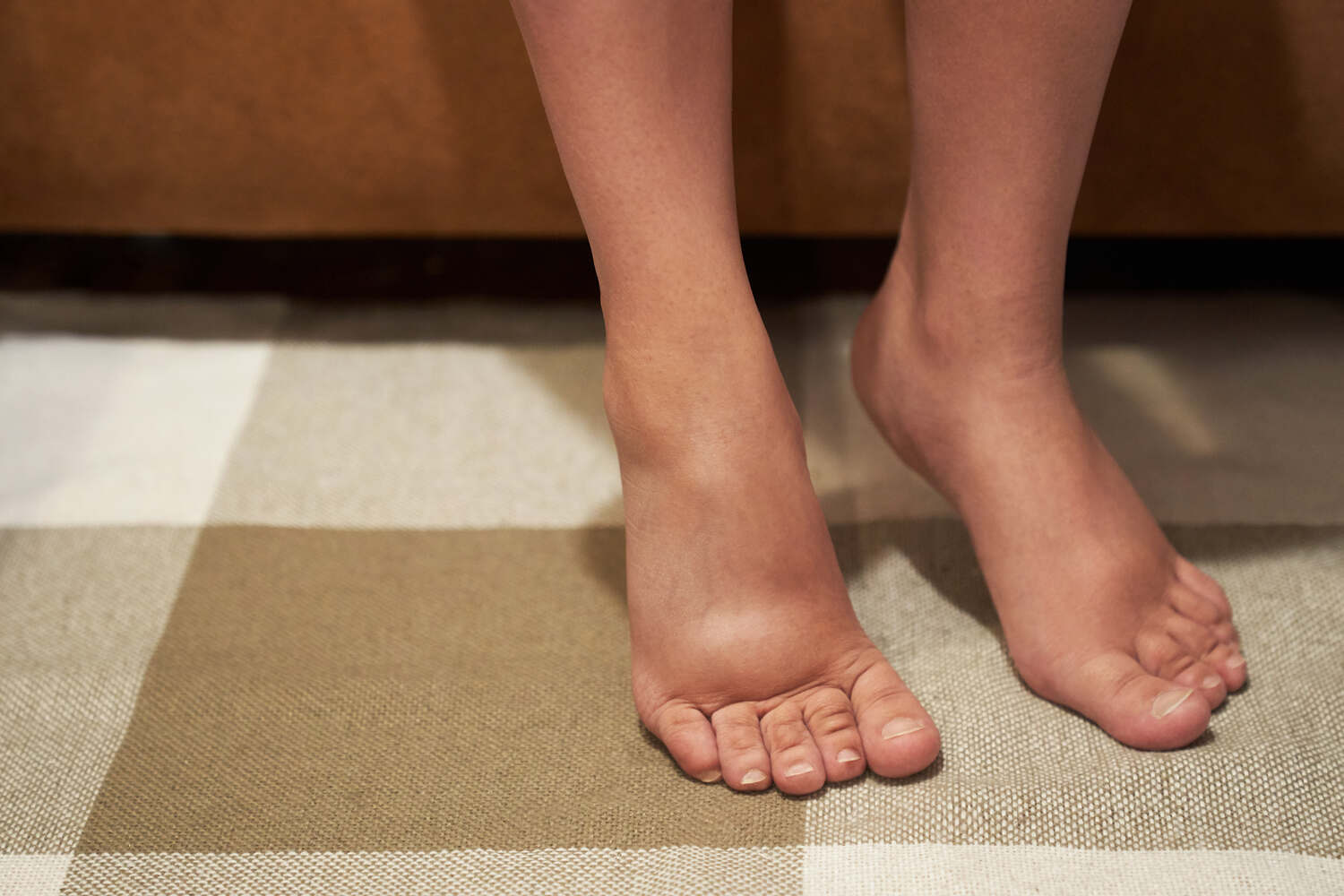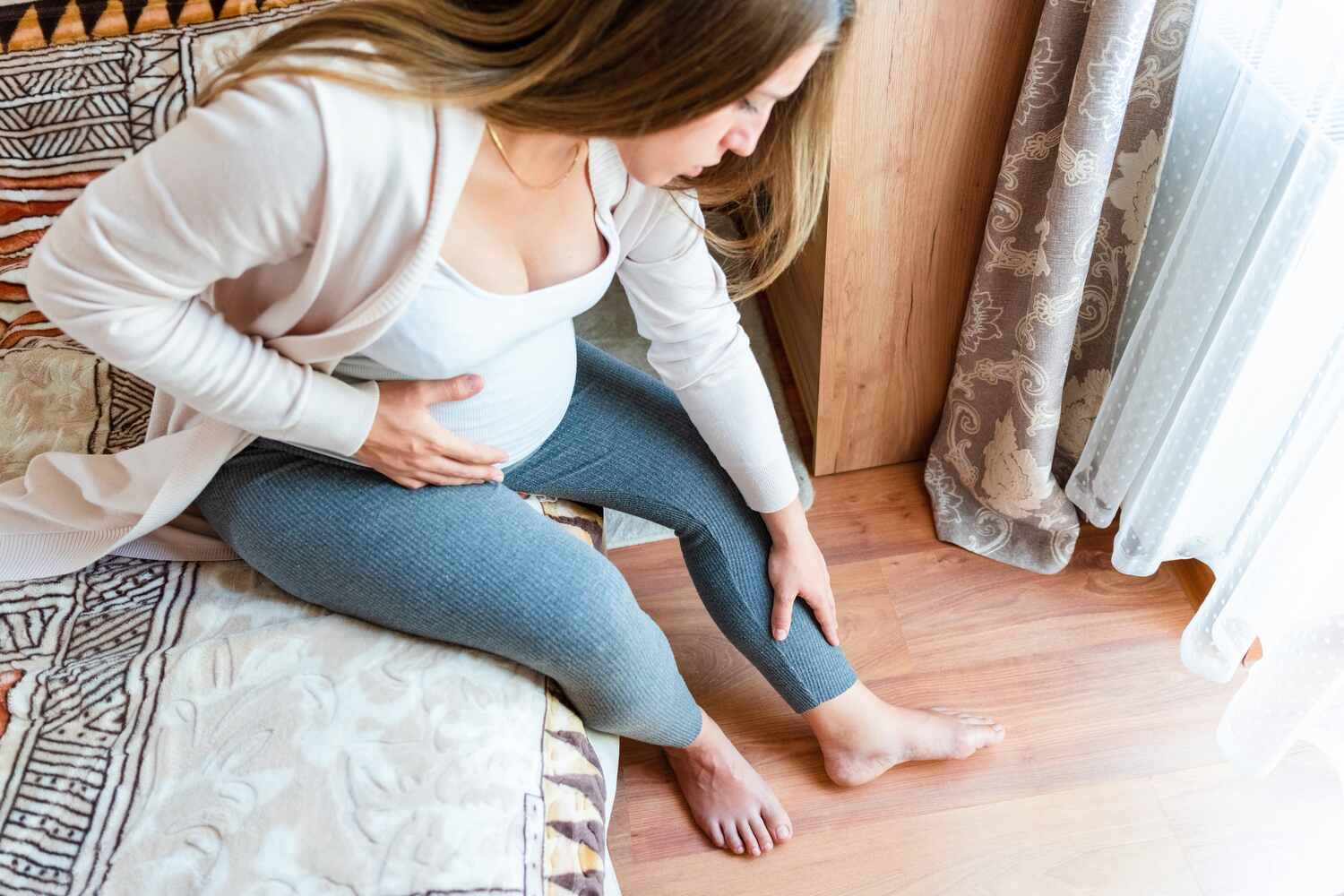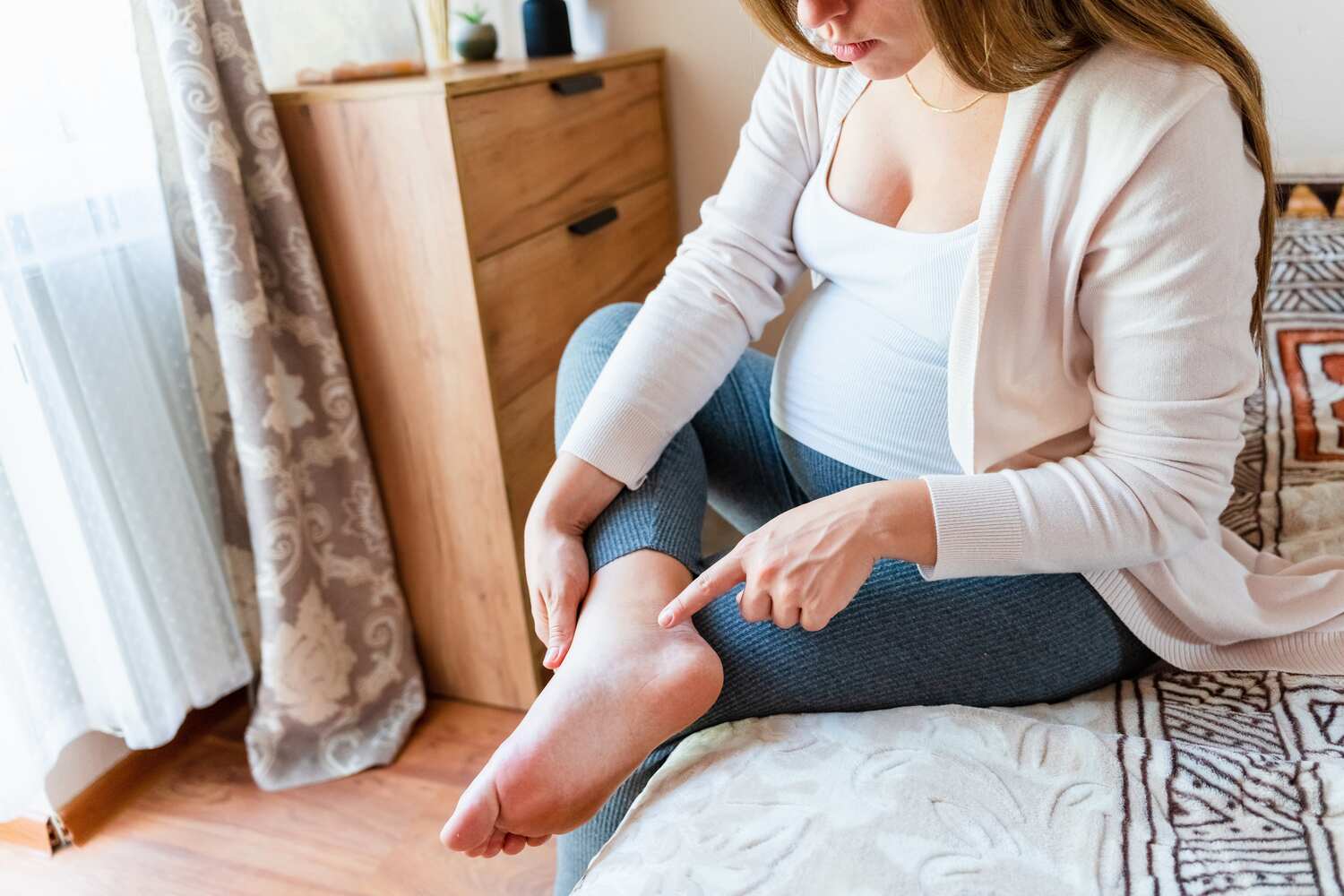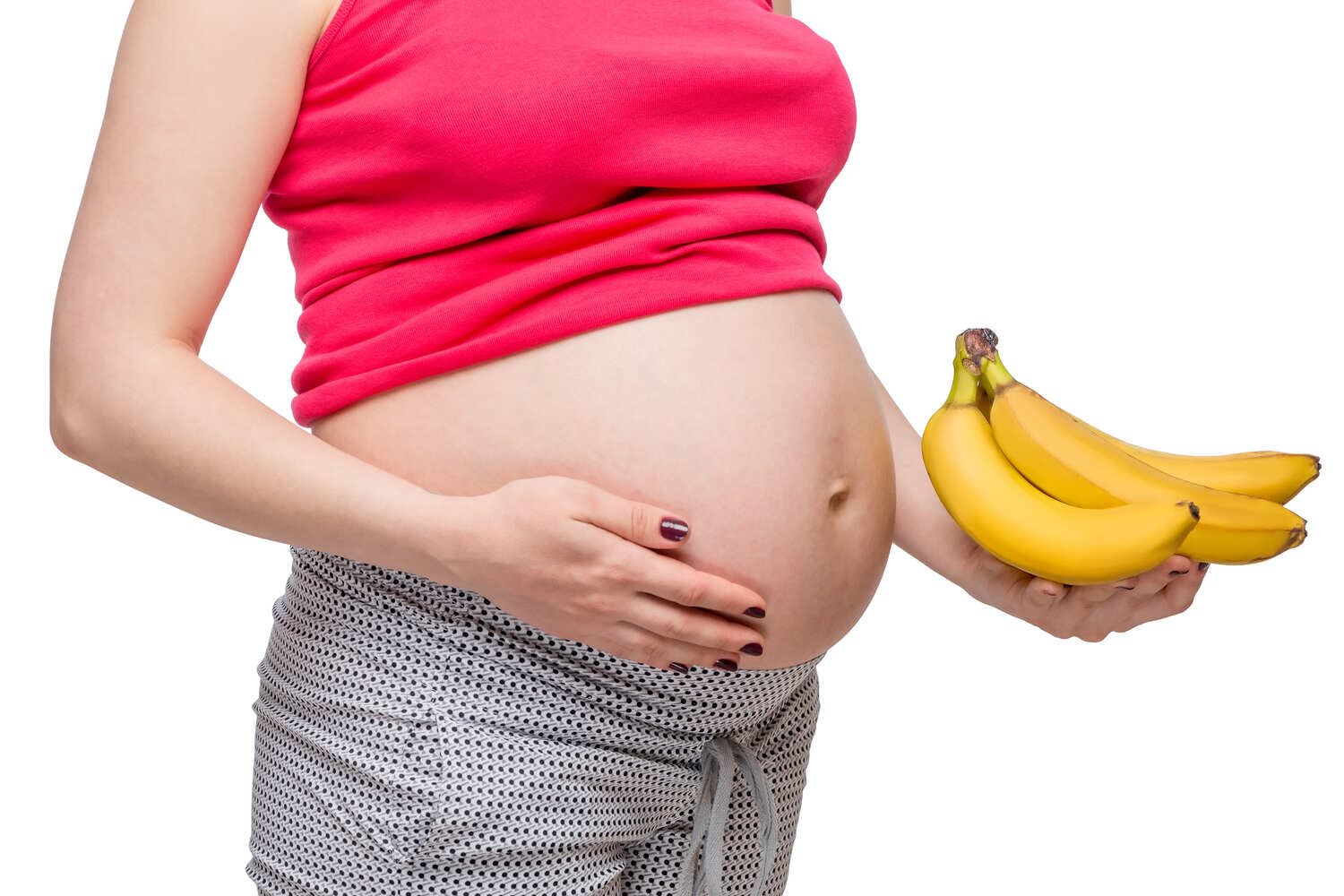 Swelling is very normal during pregnancy and can happen prominently in your legs, feet, fingers, and ankles. You can also notice the Swelling becoming worse as the due date for delivery is approaches. We can find many women frustrated and complaining about swollen legs and feet during pregnancy.
Swelling is very normal during pregnancy and can happen prominently in your legs, feet, fingers, and ankles. You can also notice the Swelling becoming worse as the due date for delivery is approaches. We can find many women frustrated and complaining about swollen legs and feet during pregnancy.
Your body undergoes several changes during pregnancy, including hormonal changes. The excess fluid and relaxin hormone are the significant players that cause your legs and fingers to swell. This article will discuss why our hands, feet, and ankles swell during pregnancy and the causes and remedies to overcome them.
In This Article
- What Is Edema?
- How Common is Edema During Pregnancy?
- Causes of Swelling (Edema) in Pregnant Women
- When Should You be Worried About Swelling During Pregnancy?
- Top 10 Remedies For Swelling During Pregnancy
- How Can You Prevent Swelling?
- FAQ’s
Video- Edema During Pregnancy
What Is Edema?
Edema or swelling is characterized by fluid accumulation in the body tissues. Typically, it happens in the peripheral body parts such as hands, feet, legs, and ankles. Moreover, it’s also common in the face and abdomen. Edema in the body parts can cause trouble in doing your daily activities (1). Although mild to moderate edema goes away naturally, if it doesn’t, it’s a good idea to visit a doctor.
How Common is Edema During Pregnancy?
 As said earlier, we know edema or swollen legs and feet are very common during pregnancy. But how common it is, is an interesting question. According to a review article published by the National Library of Medicine on edema in pregnancy, the fluid content in the body increases from 6 to 8 or 4 to 6 liters (3). This excess of two or three liters slows down the blood circulation in the body. It has been revealed that eight out of ten women show signs of edema during pregnancy.
As said earlier, we know edema or swollen legs and feet are very common during pregnancy. But how common it is, is an interesting question. According to a review article published by the National Library of Medicine on edema in pregnancy, the fluid content in the body increases from 6 to 8 or 4 to 6 liters (3). This excess of two or three liters slows down the blood circulation in the body. It has been revealed that eight out of ten women show signs of edema during pregnancy.
Causes of Swelling (Edema) in Pregnant Women
Women produce a hormone during pregnancy called relaxin. This helps in opening up your pelvis to give birth and, at the same time, ensures that the tendons, ligaments, joints, and muscles relax. It reduces uterine blood flow due to which the extra fluid accumulates in the body (2).
You may wake up with swollen feet at any time during your pregnancy, and there are several reasons. Your body produces different hormones and changes its composition to accommodate the new entrant in each trimester. Let us look at the significant player that causes edema at other trimesters.
What Causes Edema During The First Trimester?
The first trimester and morning sickness go hand in hand. So, you might not wake up to an inflated and swollen leg. But there are still chances of swollen legs and ankles. The progesterone levels in our body increase rapidly during the first trimester, which slows down digestion. It might induce swelling as it regulates inflammatory immune responses (4). The increased progesterone levels are the reasons why you might feel bloated.
What Causes Edema During The Second Trimester?
The thirteenth week is the rough estimate of the beginning of your second trimester, and this is when the swelling begins to play a peek-a-boo. During the second trimester, our body produces 50 per cent more fluid to soften the body and prepare for an easy birth. The excess fluid and blood, along with hormonal fluid retention, may wake you up with swollen feet. Though this condition causes discomfort, you can find it vanishing a few weeks after giving birth.
What Causes Edema During The Third Trimester?
The third trimester is the time when edema becomes most prevalent. From the twenty-eighth week of pregnancy, you are sure to notice that your foot looks like little sausages. There is nothing to worry about as this is part of the game for pregnant women. Your body continues to produce increasing levels of blood and fluids. As the baby grows, your uterus gets bigger and heavier. These factors combine and slow down the flow of blood from the legs to the heart. Not to panic, this is very common.
Additional Causes of Edema During Pregnancy
Apart from these, a few more factors might be the reason for Swelling. They are
- Hot climate
- Improper Diet
- Caffeine
- Dehydration
- Standing for a long time
When Should You be Worried About Swelling During Pregnancy?
 Though edema is prevalent during pregnancy, there might be complications. Let us discuss what the risks are and when to call the doctor.
Though edema is prevalent during pregnancy, there might be complications. Let us discuss what the risks are and when to call the doctor.
One of the most common medical conditions associated with edema is Preeclampsia. It is a condition where the blood pressure might shoot up high. Make sure to call the doctor if you experience any of the following, along with the swelling.
- High blood pressure
- Unexpected swelling of face, feet, hands, or around your eyes
- Blurred Vision
- Severe Headache
- Confusion
- Heavy Breathing
If you have swelling in one leg accompanied by redness, heat, or pain, it might also mean that you have Deep Vein Thrombosis (DVT). DVT is a blood clot that happens in your legs, and pregnant women are more prone to it [5].
If you notice any of these worrying signs, make sure you call your doctor immediately.
Top 10 Remedies For Swelling During Pregnancy
A swollen foot can sometimes be painful. Nevertheless, they might be very bothering at all times. You can follow simple remedial steps to ease out the discomfort.
1. Reduce Sodium Intake
Salt makes your body produce more water. You can try to reduce the overall salt intake. To do this, you can reduce the intake of processed or canned food which are very high in sodium. In your recipe, you can use savory herbs, including thyme, rosemary, and oregano, and avoid salt.
2. Increase Potassium Intake
 If your body does not have adequate potassium, you might experience swelling. Potassium helps balance the fluid content in the body, and prenatal vitamin supplements give you that extra potassium that you require. The following foods are also high in potassium.
If your body does not have adequate potassium, you might experience swelling. Potassium helps balance the fluid content in the body, and prenatal vitamin supplements give you that extra potassium that you require. The following foods are also high in potassium.
- Potatoes with skin
- Sweet Potatoes
- Bananas
- Spinach
- Beans
- Fruit Juices including Prune, Pomegranate, Orange, Carrot, and Passionfruit
- Yogurt
- Beets
- Salmon
- Lentils
3. Reduce Caffeine
Caffeine is not bad, only if it is occasional. If you are a frequent coffee drinker, it is certainly not good for the baby, and it will also make the Swelling worse. You can try a decaf coffee or herbal tea to give you that extra energy. You can talk to your gynaecologist or nutritionist to know safe alternatives for caffeine. Energy drinks and similar drinks that contain high caffeine levels are an absolute no-no.
4. Drink More Water
Keeping yourself hydrated during pregnancy is very important to avoid swelling. Try to drink at least ten glasses of water every day to ensure the proper functioning of the kidneys. If drinking water feels frustrating, try adding more flavors to it like lemon, mint, and berries.
5. Elevate Your Feet And Rest
Whenever you sit, make sure you keep your legs elevated. Sitting all the time or standing on your feet too much is not great for your blood circulation. This way, the gravitational force will push the blood towards the heart while reducing swelling.
6. Get a Massage
Massage helps in circulating the fluids in the feet. This will help in reducing the swelling at ease. Massage stimulates your lymphatic system and helps in draining out waste products to reduce swelling (6).
7. Wear Comfortable Clothes
During pregnancy, it’s a good idea to avoid wearing tight-fitted clothes. Skinny and tight clothes may irritate your skin and limit normal stretching of the muscles when it’s required. This may restrict blood flow in the legs, causing injuries to the blood vessels and leading to inflammation.
8. Exercise Regularly
Adding mild to moderate exercises like walking or foot stretches to your workout routine can lower the chances of swelling. Exercising improves blood circulation to manage inflammation while preventing cramps.
9. Try Compression Socks
Wearing knee-length compression socks may alleviate swelling and pain during pregnancy. These socks put the right pressure on your legs and push the extra blood into the vessels to reduce inflammation. Plus, these socks help with varicose veins, of which swelling is the most common symptom (7).
10. Start a Cold Therapy Session
Dipping your legs in cold water for 10 to 15 minutes is a great way to tackle swelling. This constricts the blood vessels to pump the excess blood. Further, ensure you use moderately cold water, not icy one to prevent ice burns.
How Can You Prevent Swelling?
Swelling is an unavoidable part of pregnancy. While everyone strives to prevent it, there are high chances that you might get it. We always check for the remedies only after we get affected. The best way to prevent swelling is to follow the remedies discussed above even before the swelling peeps in.
Experiencing swollen legs and feet during pregnancy is a normal phenomenon when you are pregnant and nothing to worry about. However, if your swelling is accompanied by symptoms such as high blood pressure, headache, and blood pressure, you may need to see the doctor immediately. In most cases, this swelling subsides post-deliverypost delivery. It’s better to have professional help to reduce the risk of complications.
FAQ’s
1. How Can I Reduce Swelling in my Legs During Pregnancy?
There are several ways to reduce swelling in your legs. Some methods include, educing salt intake, increasing potassium content, reducing caffeine, drinking adequate water, and wearing comfortable clothes.
- Reduce salt intake
- Increase Potassium content
- Reduce Caffeine
- Keep hydrated
- Be comfortable in your clothes
- Stay cool
2. Is Walking Good For Swollen Feet During Pregnancy?
Low-intensity exercise and walking can surely reduce swollen feet during pregnancy. Exercising boosts your immune system to synthesize more anti-inflammatory cells. These reduce the body’s inflammatory response to lower swelling.
3. What Foods Can Bring Down Swelling?
Foods such as tomatoes, olive oil, green veggies, nuts, etc., may help with managing swelling. These decrease the inflammation and minimize the risk of illness. The following anti-inflammatory foods may bring down the swelling.
- Tomatoes
- Olive Oil
- Green Leafy vegetables
- Nuts
- Fatty Fish
- Fruits include strawberries, blueberries, cherries, and oranges
References
- Third Trimester Lower Extremity Lymphorrhea
https://www.ncbi.nlm.nih.gov/pmc/articles/PMC8645402/ - Emerging Role of Relaxin in the Maternal Adaptations to Normal Pregnancy: Implications for Preeclampsia
https://www.ncbi.nlm.nih.gov/pmc/articles/PMC3381791/ - Edema in pregnancy
https://pubmed.ncbi.nlm.nih.gov/9185112/ - Progesterone-Related Immune Modulation of Pregnancy and Labor
https://www.frontiersin.org/journals/endocrinology/articles/10.3389/fendo.2019.00198/full - Deep venous thrombosis in pregnancy: incidence, pathogenesis and endovascular management
https://www.ncbi.nlm.nih.gov/pmc/articles/PMC5778511/ - Comparing the Effect of Foot Massage with Grape Seed Oil and Sweet Almond Oil on Physiological Leg Edema in Primigravidae: A Randomized Clinical Trial
https://www.ncbi.nlm.nih.gov/pmc/articles/PMC7201824/
